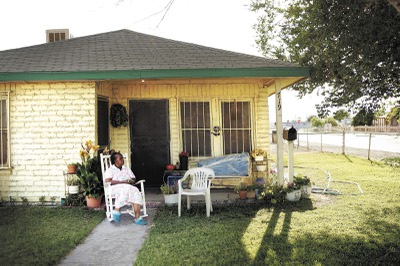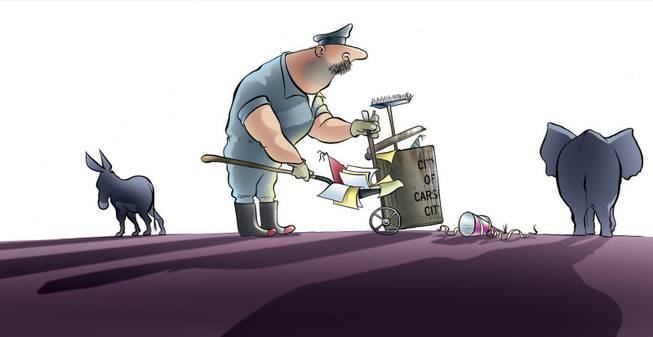Sunday, June 7, 2009 | 2 a.m.
Top Accomplishments
- $780 million in taxes, and the budget: The Legislature managed to avert larger cuts across the board, keeping the state afloat — for now.
- Domestic partner rights: With other states legalizing same-sex marriage, Nevada adopts a less sweeping alternative for unmarried couples.
The Biggest Failure
- $780 million in taxes, and the budget: Yes, Nevada is afloat, but it will be dogged by revenue issues in 2011 in part because of a tax sunset.

The Legislature overrode Gov. Jim Gibbons' veto of legislation that will fund the reopening of F Street in West Las Vegas. Above, Ora Bland rests outside her home on F Street at McWilliams Avenue, about 100 feet from where the street was closed by the state Transportation Department. Bland has lived in her home for more than 50 years.
Reader poll
Reader poll
Sun Archives
- Veto overrides ensure state funding (5-31-2009)
- Senate approves bill for education overhaul (5-30-2009)
- With veto override, domestic partners bill becomes law (5-21-2009)
- Tax hike, vetoes and economic woes define session (6-2-2009)
- Senate overrides F Street veto; cost estimated at $45M (2-23-2009)
The legislative session was impossible. Lawmakers had no choice but to cut services and increase taxes, or see state services, especially education, all but shut down.
Legislators can take some comfort in a number of accomplishments, although in other areas where they had options, they did not act.
A review by the Las Vegas Sun:
Budget
Legislators came in facing the largest deficit, as a proportion of the budget, in the nation.
Lawmakers restored some cuts Gov. Jim Gibbons proposed, using federal stimulus money and $1 billion in tax hikes — $219 million from a 3 percentage point increase in the hotel room tax and $781 million in sales and payroll tax increases.
Gibbons had proposed a 6 percent pay cut for state workers. Legislators countered with a one-day-per-month furlough, which equates to a 4.6 percent cut.
The Legislature wound up passing a two-year budget that will spend $6.8 billion, more than 90 percent of which will go for schools and higher education, health and human services and public safety.
Health and Human Services, which the governor had spared from the deepest cuts when he proposed his budget, got money added by the Legislature. Gibbons had proposed a cap on enrollees in Nevada Check Up, the state’s health care program for children of the working poor. The Legislature removed the cap.
Also removed was the cap on enrollees in a program for health insurance for pregnant women.
Rural mental health clinics that Gibbons recommended closing will remain open.
Higher education will suffer a 12.5 percent cut, far less than the 36 percent reduction Gibbons proposed.
Dan Klaich, executive vice chancellor of the Nevada System of Higher Education, said last month the university system should be able to prevent irreparable harm to higher education.
Klaich said some institutions are likely to see a de facto, if not explicit, cap on enrollments. He also said students should be prepared for tuition increases, which legislators said should be limited to 5 percent per year.
K-12 Education funding
Funding for K-12 rose compared with the previous two fiscal years, although when rising costs and enrollment growth are included, per-pupil funding was actually reduced, according to the Nevada State Education Association.
The Clark County School District has carried out some cuts in anticipation of the Legislature’s action. It’s unclear whether teachers will have to take a 4.6 percent pay cut; they have binding contracts with school districts.
Energy
At the beginning of the session, legislators declared that renewable energy policy was a top priority. Gibbons, Senate Majority Leader Steven Horsford, D-Las Vegas, Assembly Democrats and others said renewable energy offered a path to diversify the state’s economy.
The Legislature established a fund to make loans to renewable energy projects, created the position of Nevada energy commissioner, and extended tax breaks 40 years for renewable energy producers. The breaks were to expire in July.
The tax abatements for solar, wind and geothermal projects were increased for large projects, with the hope of attracting more large-scale renewable energy projects.
At the beginning of the session, lawmakers complained the state wasn’t getting enough in return for the tax abatements. Few permanent jobs are directly connected to renewable energy projects.
But developers of large renewable energy projects, backed by some of the state’s most prominent lobbyists, succeeded with arguments that the abatements were necessary to keep Nevada competitive with other states.
In return, Assemblywoman Marilyn Kirkpatrick, D-North Las Vegas, put in provisions that guarantee the construction jobs are paid a higher wage compared with other jobs in the state. Employers must try to hire at least 30 percent of their workers from Nevada.
Also, a portion of property tax money will be diverted from counties and put into a fund to reduce energy bills.
Legislation also requires NV Energy to generate 25 percent of its energy from renewable energy sources by 2025, up from 20 percent by 2015.
Reaction to the legislative package was mixed. Solar advocates praised the work done for large projects, but provisions were diluted that would have helped smaller rooftop projects.
Health Care
Legislators, riding a wave of public anger about the hepatitis C outbreak last year, passed several bills to improve patient safety, but they fell short in other regards.
A new law gives the Nevada State Health Division authority to issue cease-and-desist orders when it’s believed that patients are in danger of contracting an infectious disease at a health care facility. It also protects whistleblowers working in medical facilities.
Lawmakers also passed a Senate bill — and overrode the governor’s veto — that requires the health division to track and prepare an annual report of sentinel events, which are defined as unexpected occurrences in a hospital leading to death or serious injury or illness. The bill allows the state to apply for a federal grant that would aid in the process.
On prescription drug abuse, lobbyists succeeded in killing a bill to require pharmacists to run reports on patients to ensure they are not narcotics addicts. The bill would have given pharmacists the teeth to be a check-and-balance on doctors who over-prescribe narcotics in Nevada, where the drugs are consumed at a higher per-capita rate than in almost every other state in the nation.
Another bill would have eliminated the $350,000 cap on noneconomic damages suffered by patients in medical malpractice cases. It was passed by the Assembly but died in the Senate.
A bill to mandate that some hospitals set up staffing committees to address issues such as nurse-patient ratios was vetoed and will not become law.
Education policy
A new law will save the Clark County School District about $100,000 per construction project because it no longer has to submit architectural renderings to the local public works board for review.
Legislators ensured the continuation of a pilot program to collect the heights and weights of a representative sample of students to help researchers studying childhood obesity.
Until now, Nevada has been unable to qualify for research grants because of a lack of data. Another law requires public high schools to teach financial literacy. A bill sponsored by Assembly Speaker Barbara Buckley to create an education stabilization fund — a special rainy-day account to protect schools from future economic downturns — was vetoed by the governor, and lawmakers could not override it.
Human Rights
Civil libertarians were happy to win domestic partnerships for unmarried couples, which will grant willing unmarried partners marital-like rights.
Another new law prohibits discrimination by public facilities such as hotels based on sexual orientation.
The public employee retirement system must now disclose its investments with Iran.
Foreclosures
Buckley sponsored a law that will allow homeowners who are in trouble to enter into court-supervised mediation with their lenders.
Lawmakers also toughened regulation of mortgage lenders to try to prevent future real estate catastrophes.
Worker Safety
Legislators passed a law requiring 10 hours of safety training for construction workers and 30 hours of safety training for supervisors, a bill resulting from the 12 construction deaths on the Las Vegas Strip during a recent 18-month period.
A comprehensive overhaul of Nevada OSHA died. As the Sun has reported, OSHA has often dialed back penalties against offending construction companies after being lobbied.
F Street
Lawmakers approved, despite Gibbons’ veto, a plan to spend redevelopment money to reopen F Street, which connects a historically black neighborhood to Union Park, where Las Vegas is working to build a new downtown. F Street had been closed by the Nevada Transportation Department despite outrage from residents, who said the closure created an unsafe drug alley cut off from the rest of the city.
Environment
The Legislature authorized up to $100 million in bonds to pay for environmental cleanup at Lake Tahoe during the next 10 years, the Associated Press reported.
Public employees
Lawmakers made changes in the state’s public employee health and retirement benefit systems, forcing new workers to serve longer before they can retire and tightening rules on health care subsidies for retirees. The changes will reduce the systems’ long-term unfunded liabilities.
Legislators also gave local governments a slight edge in the collective bargaining process for local government employees, a move viewed as a response to higher-than-average salaries for those workers.
The Legislature approved over Gibbons’ veto a bill to prevent state agencies from hiring high-priced consultants.
Schwartz reported from Carson City.


Join the Discussion:
Check this out for a full explanation of our conversion to the LiveFyre commenting system and instructions on how to sign up for an account.
Full comments policy